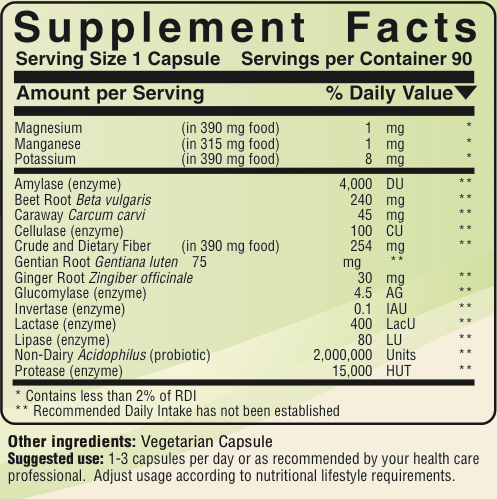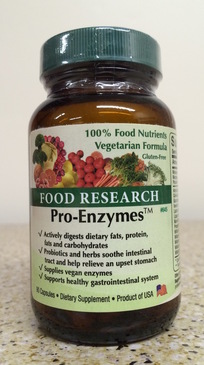
Pro-EnzymesTM
60 Vegetarian Capsules $25.98
60 Vegetarian Capsules $25.98
Digestive complaints? Think Pro-Enzymes. Why? Because enzymes are involved in every stage of the digestive process [1]. Balance and harmony are important to the entire process because, remarkably, insufficient enzymes can contribute to constipation and insufficient enzymes can contribute to diarrhea [2-3]. Active enzyme levels often decrease with age [2] (complaints of indigestion tend to increase with age). Various illnesses (and antibiotics) can upset natural intestinal flora, which are critical to the digestive process [4], and can lead to ingestion.
The primary point of digestion is to get food particles small enough to be absorbed [3]. Through the process of mastication, food is broken down into smaller pieces. Saliva contains the enzyme amylase which helps digesting certain starches. In the stomach, hydrochloric acid is released along with various proteolytic (protease) enzymes. From the stomach, the digested food (now called chyme) enters the duodenum. If lipids are detected, the hormone cholecystochinin is released. This triggers the gall bladder to secrete bile into the duodenum. Bile emulsifies lipids so that they can be digested. When the chyme enters the duodenum, the pancreas secretes a solution of sodium bicarbonate and various enzymes (such as amylase, lipase, and protease) [2,3]. These enzymes digest their respective portions of the chyme (i.e. lipase digests the lipids); however if the chyme has not been properly broken down through mastication, stomach digestion, or bile, indigestion can occur [2]). Intestinal bacteria essentially finish the process of digestion, and if the intestinal flora is inadequate or dietary fiber is inadequate indigestion, diarrhea, and/or constipation can occur [4].
Pro-Enzymes contains a combination of enzymes, herbs, and probiotics to improve the digestive processes. Oral consumption of digestive enzymes, digestive herbs, fiber, and probiotics have all been shown to improve digestion [1-5].
Amylases are enzymes which are needed to digest starches and related carbohydrates [2]. Specifically, amylases “catalyze the hydrolysis of alpha-1, 4-glycosidic linkages to polysaccharides to yield dextrins, oligosaccharides, maltose, and D-glucose” [4]. “Amylases are used as digestants” [4].
Beet root is an herb which provides fiber and “is used as supportive therapy in diseases of the liver and fatty liver” [5].
Caraway is an herb which provides fiber and “is used for gastrointestinal cramps, flatulence and feelings of fullness, as well as nervous cardiac-gastric complaints” [5].
Cellulase is an enzyme which is helpful for digesting cellulose which is contained in most plants [4]. “Cellulase is used as a digestive aid...and for the management of flatulence [4].
Crude and dietary fiber is contained within the herbal ingredients of Pro-Enzymes [6]--both fibers are important for human health. Few women meet the National Cancer Institute recommendations for consuming 20g of fiber per day [7]. Dietary fiber helps regulate nutrient absorption, sterol metabolism, cecal fermentation, and stool weight [7]. Shortages may lead to cholesterol problems, certain cancers, digestive problems, and nutrient problems [7,8].
Gentian root is an herb which provides fiber [6]. It also has been used “to stimulate bile secretion and alleviate loss of appetite, fullness, and flatulence” [5] and “can stimulate appetite and improve digestion [9].
Ginger root is an herb that contains fiber and can reduce nausea [6]. “Modern uses include prophylaxis for nausea and vomiting (associated with motion sickness, hyperemesis gravidum and surgical anesthesia), dyspepsia, lack of appetite, anorexia, colic, bronchitis, and rheumatic complaints” [9]. It also “promotes secretion of saliva, gastric juices and bile” [5]. Its ability as an anti-emetic was proven in a double-blind trial were it was shown to prevent motion/sea sickness [5].
Glucomylase is an enzyme for the digestion of maltose. It also “is the enzyme responsible for the hydrolysis and absorption of short polymers of glucose” [10] and appears helpful to reduce diarrhea [10].
Invertase is an enzyme for digesting sucrose. It “attacks beta-D-fructofuranoside (raffinose, stachyose and sucrose” [11]. “Invertase activity is stable between pH 2.6 and 5.5...maximum activity observed at pH 4.5” [11].
Lactase is an enzyme for digesting lactose. “Lactose intolerance is a benign gastrointestinal disorder caused by a deficiency of lactase necessary for the digestion of milk sugar” [12].
Lactobacillus acidophilus is a probiotic which helps increase intestinal flora and thus improve the colon’s environment [4,13]. It also has ‘demonstrated antioxidant ability’ [4]. “Probiotics have been used for some benefit in the prevention and treatment of some gastrointestinal disorders including anti-biotic associated diarrhea and some infectious and viral diarrheas...lactose intolerance, sucrase and maltase deficiencies and inflammatory bowel disease” [4].
Lipase is an enzyme which helps digest lipids (fats) [2,14]. Nearly all the digestion of lipids occurs in the intestines.
Magnesium is a mineral, naturally found in the herbal foods contained within Pro-Enzymes [6]. Dr. Bernard Jensen has written, “Man must have the biochemic (organic) form--food magnesium--rather than the inorganic form” [15]. “Signs and symptoms of magnesium deficiency include anorexia, nausea and vomiting, diarrhea...and has been implicated in increased insulin resistance” [4] and magnesium can help prevent constipation [4].
Manganese is a mineral, naturally found in the herbal foods contained within Pro-Enzymes [6]. Deficiency can result in “impaired insulin metabolism and abnormal glucose intolerance” [4]. The liver and pancreas depend on manganese for their secretions [15]
Potassium is a mineral, naturally found in the herbal foods contained within Pro-Enzymes [6]. Dr. Jensen also wrote, “Health in general, mental and physical, is accentuated by potassium...Potassium Must be Supplied in Food Form” [15]. Potassium may be helpful because it is one of the body’s most important electrolytes [4].
Protease enzymes help digest proteins [2]. Although the primary area in which proteins are digested is the stomach, further breakdown occurs in the intestines as well.
The vegetarian 100% Food Pro-Enzymes formulacontains the enzymes, herb, fiber, minerals, and probiotics that can help optimize digestion (it is also in vegetarian capsules). It is no wonder that when they think of digestive problems, that many interested in natural health think Pro-Enzymes.
Pro-Enzymes combines vegetarian enzymes, herbs, fiber, naturally occuring Food minerals, and probiotics for a balanced vegetarian digestive product. Pro-Enzymes
provides amylase for digesting starches, beet root and other herbs for
fiber and digestive support, cellulase for digesting cellulose,
glucomylase for digesting maltose, guar gum for fiber and probiotic
purposes, invertase for digesting sucrose, lactase for digesting
lactose, Lactobacillus acidophilus for a probiotic, lipase for
digesting fats, magnesium for its over 300 metabolic reactions
including nutrient absorption, manganese for its role in lipid and
carbohydrate metabolism, potassium for promoting good peristalsis, and
protease for digesting proteins.
Suggested
use: 1-3 per meal or as recommended by your health care professional.
Adjust usage according to nutritional lifestyle requirements.
References
[1] Dressler D and Potter H. Discovering Enzymes. Scientific American, New York, 1991
[2] Howell E. Enzyme Nutrition. Avery Publishing, Wayne (NJ), 1985
[3] Jenkins DJA, Wolever TMS, Jenkins AL. Diet factors affecting nutrient absorption and metabolism. In Modern Nutrition in Health and Disease, 8th ed. Lea & Febiger, Phil.:583-602, 1994
[4] Sheldon S, Rorvik D, editors. PDR for Nutritional Supplements. Medical Economics, Montvale (NJ), 2001
[5] Gruenwald J, Brendler T, Jaenicke C, editors. PDR for Herbal Medicines, 2nd ed. Medical Economics, Montvale (NJ), 2000
[6] Pederson M. Nutritional Herbology: A Reference Guide to Herbs. Whitman Books, Warsaw (IN), 1998
[7] Thompson FE, et al. Sources of fiber and fat in the diets of U.S. women ages 19 to 50: implications for nutritional education and policy. Am J Pub Health 1992, 82(5):695-702
[8] Dietary fiber: importance of function as well as amount. Lancet 1992, 340:1133-1134
[9] Burnham S, et al editors. The Review of Natural Products, 1st ed. Facts and Comparisons, St. Louis, 2001
[10] Mahta DI, et al. New strategies for the use of short polymers of glucose in diarrhea. Clin Pedr 1994:675-682
[11] Rubio MC, Runco R, Navarro AR. Invertase from a strain of Rhodotorula glutinis. Phyochemistry, 2002;61(6):605-609
[12] Bahna SL. Is it milk allergy or lactose intolerance? Immunol Allergy Clin N America, 1996;16(1):187-198
[13] Marteau P. Prebotics and probiotics for gastrointestinal health. Clin Nutr, 2001:20(Sup 1):41-45
[14] Sbarra V, et al. Digestive lipases of the newborn ferret: compensatory role of milk bile salt-dependent lipase. Pediatr Res, 1996; 40 (2):263-268
[15] Jensen B. The Chemistry of Man., vol I. Bernard Jensen Enterprises, Escondido (CA), 1983
Some of these studies (or citations) may not conform to peer review standards, therefore, the results are not conclusive. Professionals can, and often do, come to different conclusions when reviewing scientific data. None of these statements have been reviewed by the FDA. All products distributed by Doctors’ Research, Inc. are nutritional and are not intended for the treatment or prevention of any medical condition.
 |
||
|
||
